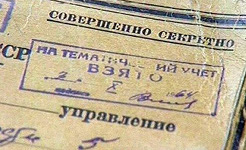|
|

Secret struggle against terrorismAndrei Soldatov Although rights activists have succeeded in eliminating one provision of an FSB-proposed draft bill on state secrets that would have blocked the media from covering most counter-terrorist operations (The Security Committee at the State Duma ruled to exclude a paragraph that classifies information on the organization of terror attacks from a draft of the bill), another provision of this measure – one that throws the veil of secrecy over the financing of such activities – has the potential to do even more harm. The victory was not only partial but more worryingly, the more substantial threat to the public’s Constitutional right to know was virtually ignored. As approved last week by the Duma’s security committee (on second reading), the bill limits journalists' activities from collecting information on terrorism to talking to people in the security services themselves, who either officially or unofficially choose to enter into contact with the press. In practice it leaves journalists without any way of verifying the information that the security services put out. It thus invites those services to present only the most self-serving information to journalists, something that will reduce the amount of attention paid to the actions of terrorists but also cut the focus on the mistakes of the security services themselves. At the same time the Duma committee left another part of the bill unchanged, and that provision may have even more far-reaching consequences. It stipulates that all information regarding the financing of anti-terrorist activities is, the FSB insists, to be classified as secret. The FSB's arguments on this point were not simply weak, they did not correspond to reality. The FSB said it had no choice but to ask for this in order to prevent the release of information about payments the agency has made to informers and others to prevent terrorist attacks. But such payments are already classified secret under the law on the security services' operations, and the actual goal of the new element to the law is to make it possible to classify any data about government funding for the struggle with terrorism. If it is passed in this format, then people who with no access to state secrets – journalists, the expert community and members of parliament - will have no way of assessing how the Russian secret services are spending money on the struggle with terrorism or of finding out whether budget funds are being used effectively or wasted. That is no small thing. When we talk about funding for the struggle with terrorism, we are not only talking about the purchase of special weapons and technology for special operations and the payment of agents. Instead, in Russia, albeit to a lesser degree than in the US, there is an entire counterterrorism industry involved. Two years ago, Nikolai Patrushev, then head of the National Anti-Terrorist Committee, approved a plan for the struggle with terrorist ideology. This program, which runs until 2012, involves making films, setting up websites, holding competitions for the best works on counter-terrorism, organizing international conferences and festivals and even publishing fiction. If the budget for these activities is kept hidden, then information about those individuals who are involved in executing these plans is also kept hidden, something that makes it extremely difficult for anyone lacking access to state secrets to assess the effectiveness of these programs. For instance, it would be very interesting to hear experts opinion about the directive ‘to develop and introduce into the practice of the work of specialized medical institutions complex psycho-physiological methods of identifying risk groups (‘those inclined to terrorist activity’)” for deciding on prophylactic measures (a quote from the plan approved by Patrushev). It would be most interesting to learn just what measures are being used – those of Lombroso or perhaps some that are a little more contemporary such as, say, eugenics? And it would be especially interesting to find out just what funds have already been spent on the development and introduction of these measures. It is also curious that the media and the legal rights community have almost ignored this line in the draft bill. Apparently, the problem is that in our country no attempts have ever been made to put government spending on the force structures under public control. This is the unfortunate status quo with which we are faced, perhaps it seems strange to some, that the powers that be are taking a right away from us, since after all, it is not a right we have ever attempted to exercise. Agentura.Ru October 22, 2010, published in Ezhednevny Journal |
|||||

